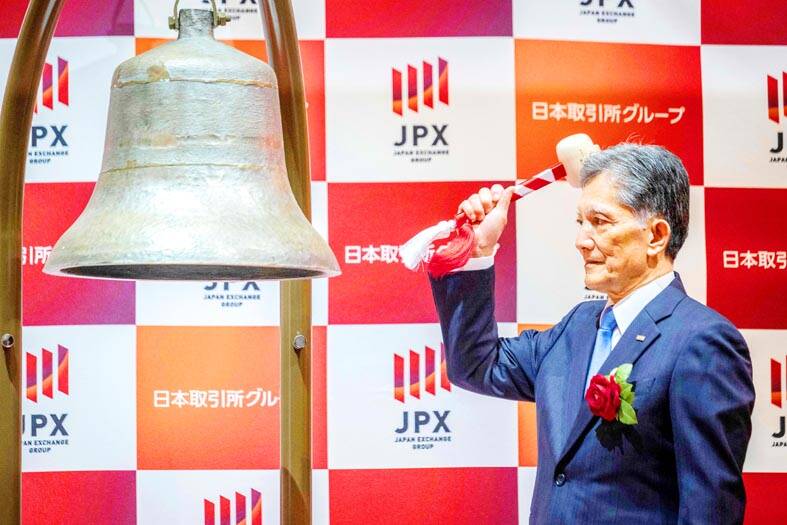Shares in Japanese chipmaker Kioxia Holdings Corp closed 10 percent higher in Tokyo yesterday after an initial public offering (IPO) that valued the firm at more than US$5 billion.
Formerly the semiconductor unit of Japanese engineering giant Toshiba Corp, the firm is the world’s third-largest producer of NAND flash memory chips.
It was acquired by US investment firm Bain Capital & Co in 2018.

Photo: AFP
Memory chips are used in everyday devices such as smartphones and storage drives, as well as in industrial and medical equipment, but their prices are notoriously volatile.
Global demand for the chips has been driven by the growth of generative artificial intelligence (AI) technology, such as that used in OpenAI’s ChatGPT.
Kioxia had been expected to go public in October, emboldened by soaring demand for AI, but a rout in tech shares forced the company to delay until this month.
The firm set its listing price at ¥1,455 per share, valuing it at ¥784 billion (US$5.1 billion) and raising about ¥120 billion — making it Japan’s second-biggest IPO this year.
Its shares closed 10 percent higher at ¥1,601.
The company previously said it planned to issue about 21.5 million new shares, in addition to more than 63 million to be sold at home and abroad by existing shareholders Bain Capital and Toshiba.
Kioxia is among several Japanese semiconductor producers that the Japanese government is subsidizing as it seeks to triple the sales of domestically produced chips to more than ¥15 trillion by 2030.

Real estate agent and property developer JSL Construction & Development Co (愛山林) led the average compensation rankings among companies listed on the Taiwan Stock Exchange (TWSE) last year, while contract chipmaker Taiwan Semiconductor Manufacturing Co (TSMC, 台積電) finished 14th. JSL Construction paid its employees total average compensation of NT$4.78 million (US$159,701), down 13.5 percent from a year earlier, but still ahead of the most profitable listed tech giants, including TSMC, TWSE data showed. Last year, the average compensation (which includes salary, overtime, bonuses and allowances) paid by TSMC rose 21.6 percent to reach about NT$3.33 million, lifting its ranking by 10 notches

Popular vape brands such as Geek Bar might get more expensive in the US — if you can find them at all. Shipments of vapes from China to the US ground to a near halt last month from a year ago, official data showed, hit by US President Donald Trump’s tariffs and a crackdown on unauthorized e-cigarettes in the world’s biggest market for smoking alternatives. That includes Geek Bar, a brand of flavored vapes that is not authorized to sell in the US, but which had been widely available due to porous import controls. One retailer, who asked not to be named, because

SEASONAL WEAKNESS: The combined revenue of the top 10 foundries fell 5.4%, but rush orders and China’s subsidies partially offset slowing demand Taiwan Semiconductor Manufacturing Co (TSMC, 台積電) further solidified its dominance in the global wafer foundry business in the first quarter of this year, remaining far ahead of its closest rival, Samsung Electronics Co, TrendForce Corp (集邦科技) said yesterday. TSMC posted US$25.52 billion in sales in the January-to-March period, down 5 percent from the previous quarter, but its market share rose from 67.1 percent the previous quarter to 67.6 percent, TrendForce said in a report. While smartphone-related wafer shipments declined in the first quarter due to seasonal factors, solid demand for artificial intelligence (AI) and high-performance computing (HPC) devices and urgent TV-related orders

Prices of gasoline and diesel products at domestic fuel stations are this week to rise NT$0.2 and NT$0.3 per liter respectively, after international crude oil prices increased last week, CPC Corp, Taiwan (台灣中油) and Formosa Petrochemical Corp (台塑石化) said yesterday. International crude oil prices last week snapped a two-week losing streak as the geopolitical situation between Russia and Ukraine turned increasingly tense, CPC said in a statement. News that some oil production facilities in Alberta, Canada, were shut down due to wildfires and that US-Iran nuclear talks made no progress also helped push oil prices to a significant weekly gain, Formosa said